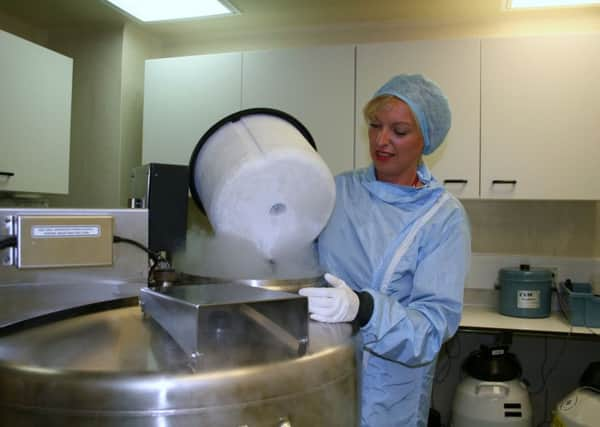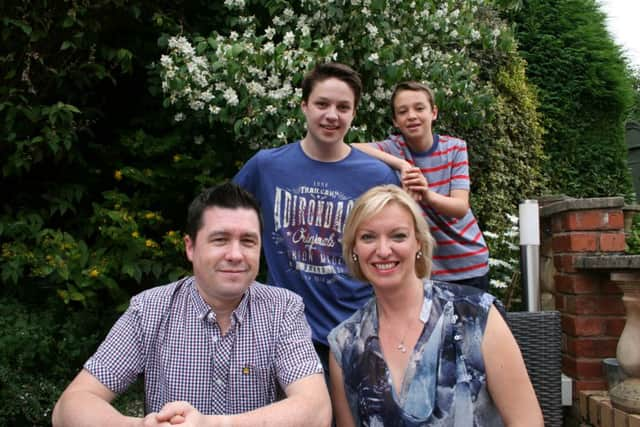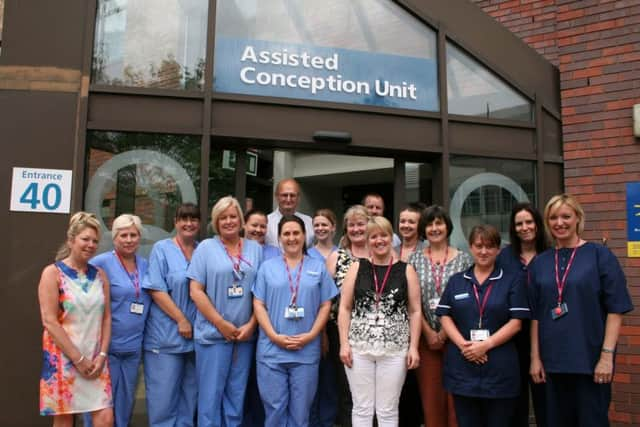The woman at the cutting edge of fertility


For 21 years Rachel Cutting has been helping to make the dreams of couples wanting to become parents a reality.
The 42-year-old mum of two has been instrumental in bringing about many of the 3,000 IVF babies born since the opening of one of the most successful fully NHS managed Assisted Conception units in the UK Rachel is principal embryologist at Jessop Fertility, based at the Hallamshire Hospital in Sheffield.In 2015 she was awarded an MBE in Queen’s Birthday Honours List, for services to infertility and was dubbed Healthcare Scientist of the Year award in 2012.
Advertisement
Hide AdAdvertisement
Hide AdThe girl who grew up in a quiet rural farming community in North Derbyshire has also made a significant contribution to research and development of the embryology profession in the UK and has driven changes in the way IVF treatment is carried out across the country.


She is also committed to sharing best practice across the globe, running teaching workshops in countries as far afield as Iran and China and Myanmar.
Yet despite this enviable track record, Rachel simply sees herself as a member of a tight knit and successful team at her workplace.
“It’s my second family and my second home,” she says. And she is extremely keen to dismiss any sober academic image.
Advertisement
Hide AdAdvertisement
Hide Ad“Scientists are often seen as mad professors wearing white coats, but I prefer to put patients’ minds at rest and show that we are considerate, compassionate and caring people. We have great empathy for our patients and respect their dignity.


“Patients are giving us their eggs and sperm so they have to put their trust in us to look after their embryos which are their future children, so for me building a good relationship with a patient is very important.”
Although IVF babies were once commonly referred to as test tube babies, the fertilisation of egg and sperm is actually undertaken in a plastic Petri dish. The embryo is grown for up to five days outside the womb and then transferred back to the woman.At Sheffield the current chances of a successful pregnancy outcome are 47 per cent – a ten per cent increase since last year alone.
Rachel’s enthusiasm for witnessing the act of creation, outside the body, in a Petri dish, has never waned since she began training and although she is responsible for managing the lab, writing national training schemes for embryologists, developing the curriculum and lecturing, she still manages to undertake a lot of routine embryology.
Advertisement
Hide AdAdvertisement
Hide Ad“I get such a buzz looking through a microscope. You see the egg then the sperm buzzing around it and I get so excited that it could become a baby. I love the science and the biology fascinates me – to see a cell dividing and an embryo develop.”


Many patients, for whom IVF is successful, repeatedly return to the unit with their babies, bringing photographs at birthdays and Christmases– and the visitor can’t help but notice the pin board in reception crammed with snapshots of beautiful babies supplied by proud and grateful parents.
“I feel hugely involved in the care of patients because I speak to them on a daily basis when the embryos are in the lab and there isn’t a day goes by when I don’t check the daily pregnancy test list. Of course it always makes you smile when you have been successful. It’s not just about someone coming in, having a baby and going away, a lot of patients come back have second and sometimes third babies and we get to know them. We are effectively creating families and that is lovely.”
Rachel who lives with her partner of eight years Chris Mapp and her two sons, knew from a young age that she wanted to work in science. She studied physiology and biochemistry at Nottingham University from 1991 to 1994. “We did a lot of reproduction modules and it completely captured my interest.”
Advertisement
Hide AdAdvertisement
Hide AdWhen she visited the former Infertility Research Unit at the former Jessop Hospital in Sheffield she was smitten.


“It amazed me what you could do for people and that was when I decided I would go into IVF. Twenty-one years later, I still love it!”
Rachel’s career prompted her to have children relatively young in life. Eldest son Joe was born when she was 25 years old and Henry when she was 29. “Being aware of infertility prompted me to get on with having children. Working in IVF makes you realise that having children doesn’t always happen automatically and the biology side of things made me realise you should not leave it too late. This is an important message for women now because we have careers, mortgages to pay and a lot of demands are put on us in our working life.
“If people think they have a problem they should go to their GP and get referred because once you get to the age of 40 you have a less than 10 per cent chance of becoming pregnant.” With more babies now being born to women in their 40s than to teenagers Rachel is keen to warn that fertility declines with age and that one in six couples now need IVF to conceive.
Advertisement
Hide AdAdvertisement
Hide AdRachel has put her success in combining a highly successful career with a family down to the support she has received from her own family.
“I’ve always worked fulltime and had tremendous support from parents on both sides. There’s no way I could have worked full time and had the career I have had without parental help.” she said.
PANEL
A central plank of Rachel Cutting’s work, which partly led to her being awarded Healthcare Scientist of the Year, by the Chief Scientific Officer of the Department of Health in 2012 and the MBE in 2015, has been her pivotal role in the “One At A Time” project, set up by the HFEA (Human Fertilisation and Embryology Association).
The project members recognised that the biggest single risk to the health of both mothers and babies following IVF was twin (or multiple) pregnancies and aimed to reduce this hazard scientifically by advocating Single Embryo Transfer.
Advertisement
Hide AdAdvertisement
Hide AdRachel worked collaboratively to drive forward a national programme advancing Single Embryo Transfer, writing guidelines which changed clinical embryology practise and made Single Embryo Transfer (SET) a routine way of working.
In 2008, one in four IVF pregnancies were multiple birth, now the figure is down to one in ten – in line with HFEA guidelines.
At the Assisted Conception Unit in Sheffield, it is below that figure.